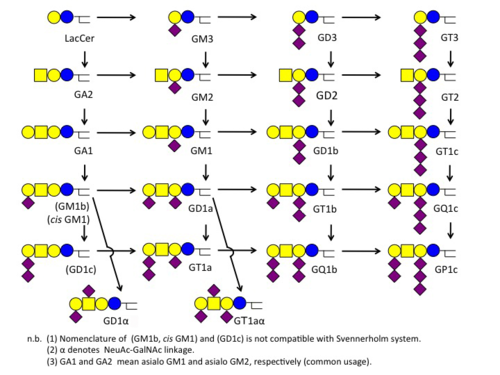Category:LBSG: Difference between revisions
| Line 7: | Line 7: | ||
==Sialic acid== | ==Sialic acid== | ||
{{Twocolumn| | {{Twocolumn| | ||
Sialic acid is a collective noun and comprises a family of derivatives of neuraminic acid (5-amino-3,5-dideoxy-D-glycero-D-galacto-nonulosonic acid)<ref>Roland Schauer "Sialic Acids - Chemistry, Metabolism and Function" Springer-Verlag, 1982.</ref>. | Sialic acid is a collective noun and comprises a family of derivatives of neuraminic acid (5-amino- 3,5-dideoxy- D-glycero- D-galacto- nonulosonic acid)<ref>Roland Schauer "Sialic Acids - Chemistry, Metabolism and Function" Springer-Verlag, 1982.</ref>. | ||
Nowadays, there are over 30 derivatives of neuraminic acid, including N-acetyl neuraminic acid (NeuAc), N-glycolyl neuraminic acid (NeuGc), deamino neuraminic acid (KDN: 3-deoxy- D-glycero- D-galacto- nonulosonic acid), all collectively called sialic acids. | |||
| | |||
シアル酸は、ノイラミン酸(5-アミノ-3,5-ジデオキシ-D-グリセロ-D-ガラクト-ノヌロン酸)に由来する物質の総称です。 | |||
現在、ノイラミン酸にはN-アセチルノイラミン酸 (NeuAc)、N-グリコリルノイラミン酸 (NeuGc)、 デアミノノイラミン酸 (KDN: 3-deoxy-D-glycero-D-galacto-nonulosonic acid) を含む 30 種以上の誘導体が知られ、全てシアル酸と呼ばれます。 | |||
}} | |||
===History=== | |||
{{Twocolumn| | |||
* Gunnar Blix found a novel acidic aminosugars from salivary gland mucin in 1936 and later named it sialic acid (1938)<ref>A Lundblad "Gunnar Blix and his discovery of sialic acids. Fascinating molecules in glycobiology" Ups J Med Sci. 120(2):104–112, 2015</ref>. (Dried salivary mucin contains 2% sialic acid.) | * Gunnar Blix found a novel acidic aminosugars from salivary gland mucin in 1936 and later named it sialic acid (1938)<ref>A Lundblad "Gunnar Blix and his discovery of sialic acids. Fascinating molecules in glycobiology" Ups J Med Sci. 120(2):104–112, 2015</ref>. (Dried salivary mucin contains 2% sialic acid.) | ||
* Ernst Klenk identified "Substanz X" from the brain (neuro) of Tay-Sach's disease patient (1935) and later identified a polyhydroxyamino carboxylic acid, and called it neuraminic acid (1941). | * Ernst Klenk identified "Substanz X" from the brain (neuro) of Tay-Sach's disease patient (1935) and later identified a polyhydroxyamino carboxylic acid, and called it neuraminic acid (1941). | ||
* Both substances are then found identical, and the correct structure was postulated by Alfred Gottshalk in 1945. | * Both substances are then found identical, and the correct structure was postulated by Alfred Gottshalk in 1945. | ||
* In the same period, Tamio Yamakawa and Sakaru Suzuki identified a novel ganglioside from horse erythrocyte stroma and named it hematoside (1951), now called GM3. | * In the same period, Tamio Yamakawa and Sakaru Suzuki identified a novel ganglioside from horse erythrocyte stroma and named it hematoside (1951), now called GM3. | ||
| | | | ||
* Gunnar Blixが1936年に唾液(sialo)のムチンから新規の酸性アミノ糖を見つけ、後にこれをシアル酸と名づけました(1938)。 | * Gunnar Blixが1936年に唾液(sialo)のムチンから新規の酸性アミノ糖を見つけ、後にこれをシアル酸と名づけました(1938)。 | ||
* Ernst Klenkはテイサックス病患者の脳から「物質X」を見つけ (1935)、後に加水分解によって水酸化アミノカルボン酸であるノイラミン酸を抽出しました。 | * Ernst Klenkはテイサックス病患者の脳から「物質X」を見つけ (1935)、後に加水分解によって水酸化アミノカルボン酸であるノイラミン酸を抽出しました。 | ||
* 両者は同一物質であることがわかり、Alfred Gottshalkが1945年に正しい構造を提出しました。 | * 両者は同一物質であることがわかり、Alfred Gottshalkが1945年に正しい構造を提出しました。 | ||
* Klenkとほぼ同時代に山川民夫と鈴木旺は馬の赤血球からヘキソースアミンを含まないガングリオシドを抽出し、1951年ヘマトシドと名付けました(現在のGM3)<ref>JN Kanfer and S Hakomori "Sphingolipid biochemistry" Chapter 1, Springer Science & Business Media, 2012</ref>。 | * Klenkとほぼ同時代に山川民夫と鈴木旺は馬の赤血球からヘキソースアミンを含まないガングリオシドを抽出し、1951年ヘマトシドと名付けました(現在のGM3)<ref>JN Kanfer and S Hakomori "Sphingolipid biochemistry" Chapter 1, Springer Science & Business Media, 2012</ref>。 | ||
}} | }} | ||
Revision as of 09:22, 12 February 2016
Sialic acid
Sialic acid is a collective noun and comprises a family of derivatives of neuraminic acid (5-amino- 3,5-dideoxy- D-glycero- D-galacto- nonulosonic acid)[1]. Nowadays, there are over 30 derivatives of neuraminic acid, including N-acetyl neuraminic acid (NeuAc), N-glycolyl neuraminic acid (NeuGc), deamino neuraminic acid (KDN: 3-deoxy- D-glycero- D-galacto- nonulosonic acid), all collectively called sialic acids. |
シアル酸は、ノイラミン酸(5-アミノ-3,5-ジデオキシ-D-グリセロ-D-ガラクト-ノヌロン酸)に由来する物質の総称です。 現在、ノイラミン酸にはN-アセチルノイラミン酸 (NeuAc)、N-グリコリルノイラミン酸 (NeuGc)、 デアミノノイラミン酸 (KDN: 3-deoxy-D-glycero-D-galacto-nonulosonic acid) を含む 30 種以上の誘導体が知られ、全てシアル酸と呼ばれます。 |
History
|
|
- ↑ Roland Schauer "Sialic Acids - Chemistry, Metabolism and Function" Springer-Verlag, 1982.
- ↑ A Lundblad "Gunnar Blix and his discovery of sialic acids. Fascinating molecules in glycobiology" Ups J Med Sci. 120(2):104–112, 2015
- ↑ JN Kanfer and S Hakomori "Sphingolipid biochemistry" Chapter 1, Springer Science & Business Media, 2012
Ganglioside
Ganglioside is a glycosphingolipid with one or more sialic acid. Major structures include ganglio, lacto, and neolacto series. In mammalian brains, ganglioside contains primarily d20:1 long chain base and stearic acid (18:0, about 80%) and does not include hydroxy fatty acids. |
酸性糖であるシアル酸を含む糖脂質をガングリオシドと呼び、主要系列にガングリオ、ラクト、ネオラクト等を含みます。哺乳類の脳では基本的にd20:1の長鎖塩基とステアリン酸(18:0)で構成され、酸化脂質は含みません。 |
Svennerholm Notation / スヴェナーホルム表記
The notation was proposed by the Swedish scientist, Lars Svennerholm. Each alpha-numeric digit stands for the number of sialic acids or sugars. |
スウェーデンの科学者 Lars Svennerholm が導入した記法です。各桁の数字やアルファベットはシアル酸の数や糖の数を意味します。 |
| Indicated number | 1 | 2 | 3 | 4 |
|---|---|---|---|---|
| Number of sialic acids | GM | GD | GT | GQ |
| Number of sugars | tetraose (4) | triose (3) | lactose (2) | galactose (1) |
| Sialic acids attached to the second Gal | a | b | c | - |
- Examples
- GQ1b ... 4 sialic acids, 4 sugars, 2 sialic acids attached to the 2nd galactose
- GM2 ... 1 sialic acids, 3 sugars.
Sulfatide
|
硫酸化糖脂質の中でもガラクトースの3位の水酸基に硫酸を導入したものをスルファチドと呼ぶ。これはガラクトシルセラミドと並んでミエリンの主要糖脂質である。 |
This category currently contains no pages or media.
